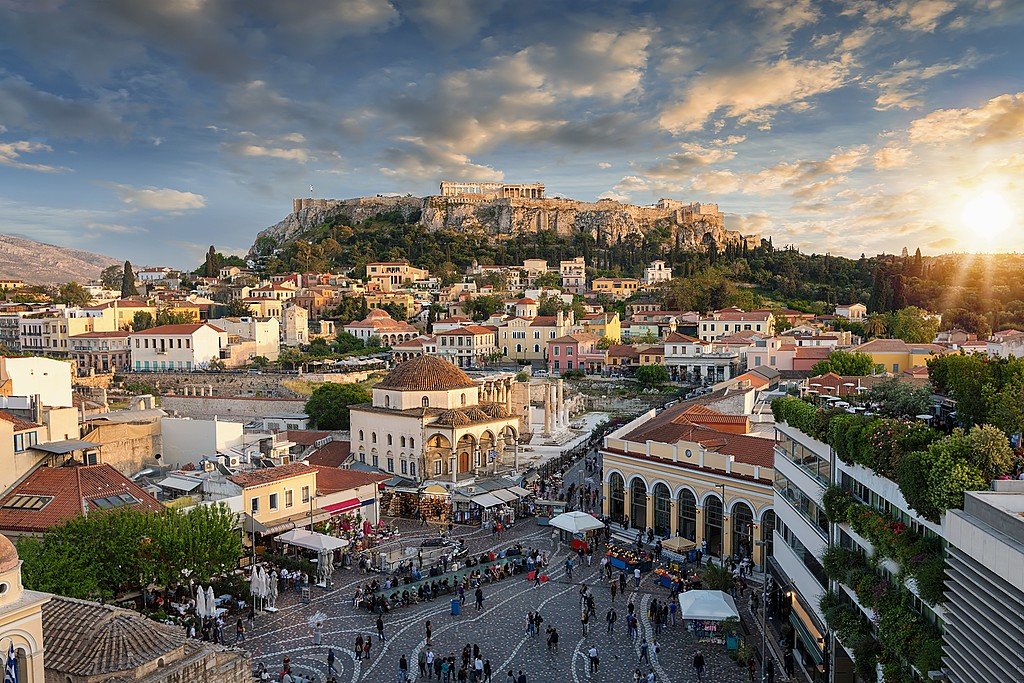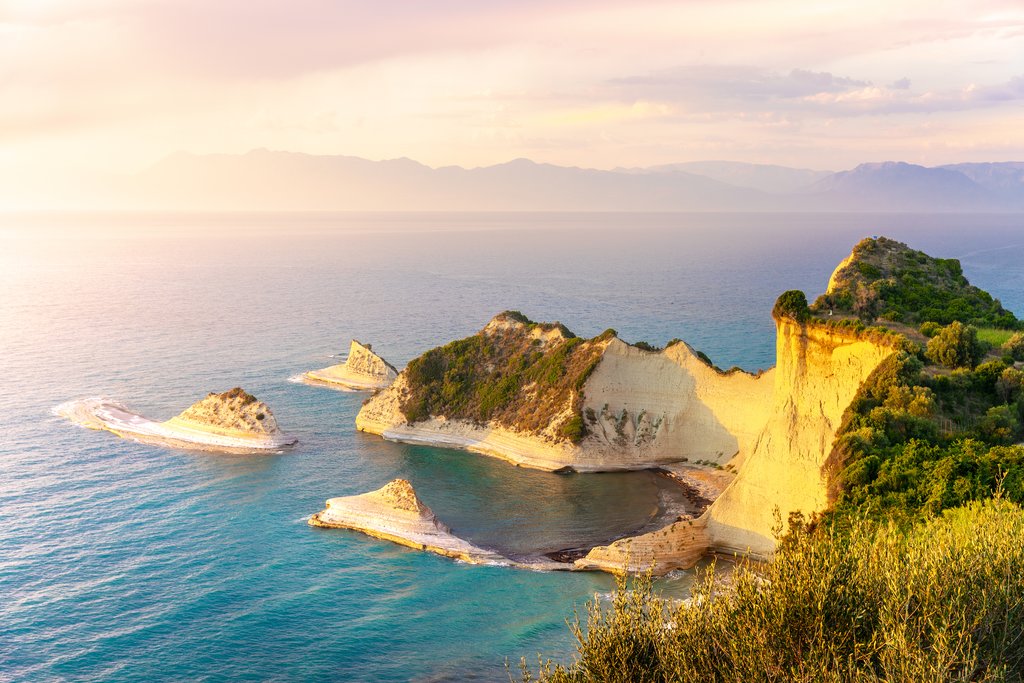Highlights
- Climb to the clifftop monasteries of Meteora
- Relax by the lake in Ioannina
- Trek through the Zagori stone villages
- Follow in the footsteps of Odysseus
Brief Itinerary
| Day | Highlights | Overnight |
|---|---|---|
| Day 1 | Arrive in Athens, Fly to Thessaloniki | Thessaloniki |
| Day 2 | Drive to Meteora | Kalabaka |
| Day 3 | Travel to Ioannina | Ioannina |
| Day 4 | Travel to Zagori | Zagori |
| Day 5 | Zagori Bridges and Villages Hike | Zagori |
| Day 6 | Travel to Corfu, Food Tour | Corfu |
| Day 7 | Odyssey Tour | Corfu |
| Day 8 | Return to Athens, Depart |
Detailed Itinerary
Day 1: Arrive in Athens, Fly to Thessaloniki

Welcome to Greece! Your journey begins in history-rich Thessaloniki in the north. After landing in Athens, you'll transfer to your short flight to this dynamic city.
The day is yours to explore with a self-guided walking tour, so you can pick and choose based on your interests and time of arrival. You'll start with history, scoping out the UNESCO World Heritage listed Byzantine churches and the Roman agora, which hosted traders from around the Mediterranean for thousands of years.
Continue to the modern food and flower markets amid the riots of color and flavor on view. Don't miss the opportunity to sample the bougatsa, a typical semolina-based dessert. Keep going on to the crypt of Saint Dimitrios, a subterranean space recently discovered below the church. You'll learn about the range of cultures that have shaped Thessaloniki as you go, including Ottomans, Christians, and Jews.
End your trip at the top of the White Tower. This fifteenth-century structure is one of the city's most famous landmarks and its unofficial symbol, and is home to both a history museum and views across the water.
Day 2: Drive to Meteora

Drive across the Central Greece countryside to visit the famous monasteries of Meteora. These clifftop monasteries, including Megalo Meteoron and Agios Stefanos, sit perched atop high rock formations but are still inhabited and used by monks and nuns today. The area has been named a UNESCO World Heritage site and is one of the largest pilgrimage sites in Greece.
Meet your guide for three hours among the monasteries. You'll see all six of the monasteries, with visits inside one or two of them for a glimpse of what the ninth-century monastic life may have been like.
You'll tread the same paths that monks used for hundreds of years to reach these holy places, perched close to 1,000 feet in the air above the canyons of the Pindos range. Before the paths were constructed, the monastery residents used nets and rope ladders to hoist goods (and sometimes their fellow clergy) to the clifftops.
Day 3: Travel to Ioannina

Today brings you to Ioannina, a lakeside city that was once the center of the Enlightenment in Greece, with well-preserved buildings, examples of Ottoman architecture and influence, and a silver-grey lake. It's also the gateway to the mountain villages of Zagori.
Ioannina's old town is still surrounded by the old defensive walls, which wrap around buildings full of Greece's Ottoman heritage and folkloric architecture, and the fortified castle is one of the oldest Byzantine castles in the country. Walk its streets, looking out for the silversmithing that the city is known for, or get outside the walls and follow the paths along the shores of the lake instead. Take in the waterfront views while enjoying a sherbetia, a sweet wine flavored with fruit and flowers.
Chat with a local specialist who can help organize your trip.
Day 4: Travel to Zagori

After breakfast, head to the fairytale Zagori Villages. This cluster of more than 40 hillside villages hides its well-preserved stone structures among the snowcapped mountain peaks, rivers, and gorges of Pindos, built amphitheatrically amid unspoiled landscapes.
Whether you choose to linger under the trees, explore old monasteries, or visit the stone mansions of well-known residents, you're sure to find something to enchant you. Though Zagori is most popular as a winter destination, the mountain towns are equally as charming amid autumn foliage or in spring and summer when the peonies and hydrangeas bloom.
Many of the villages are on the List of Traditional Settlements of Greece, a testament to their unchanged nature over the years. Your local specialist will provide you with a custom guidebook to help you decide where to wander.
Day 5: Zagori Bridges and Villages Hike

Discover the rest of the Zagorichoria, villages of Zagori, in the Pindos mountains, the ideal spot for fairytale exploration.
Due to the unique flora and fauna present in the region, it's been designated a national park with strict preservation rules. You'll take an easy guided half-day hike (great for families), taking in views of the surrounding scenery and learning about the history and culture of the region. It's a beautiful walk among the stone houses, small farms, and river bridges, which were built with a special technique believed to be unique to the region.
Stop at the sixteenth-century Monastery of Pagia Spiliotissa for some bonus exploring, built atop a rock overlooking the Voidomatis river. The village of Vitsa makes an ideal stop for lunch, especially if you can find the area's mushroom-hunting expert. Spend the rest of your day resting and enjoying the slow pace of life in this region.
Day 6: Travel to Corfu, Food Tour

In the morning, you'll head to the coast of the Ionian Sea and hop aboard a boat transfer to the island of Corfu. Watch for the many species of marine mammals that call the surrounding waters home on your way, and see why Odysseus was able to recuperate from his mythological journeys here.
You'll enter the city past its two guardians of the Old Fort and New Fort. The former was built in the thirteenth century and is surrounded by a seawater moat. It hides a slew of iconography, including the Porta Sopranza, winged lions of Saint Mark, and the Doric-inspired Church of St. George behind its walls. The New Fort on the northwestern border, meanwhile, boasts cubist military architecture.
Eat your way around the Old Town after your arrival with a guided food tour. You'll spend three hours sampling everything Corfu has to offer, noticing its traditional roots and Italian influence along the way. Meet the players of the local food scene as you learn about the history of Corfiot food and ingredients and visit the open-air markets. Your samples will include loukomades (fried dough with honey), spinach and cheese pies, kumquats, cold cuts, and seafood mezze, along with ingredients like traditional butter and cream, olive oil, and plenty of ouzo to wash it down.
Don't leave the Old Town at the end of your tour, but instead spend some time walking off all that food around this UNESCO World Heritage site. Look up to see the crisscrossing balconies indicative of Corfu's Neapolitan influence or have a seat in Spianada Square to watch the city life go by.
Day 7: Odyssey Tour

Travel back to Homer's Odyssey with this adventure. According to the story, Corfu was the island of the Phaeacians, where Odysseus was shipwrecked during a storm while trying to escape from the nymph Calypso. Your guide will take you around the island to points relevant to this Classical epic over the course of this 6-hour tour.
Some top stops include the beautiful Paleokastritsa bay, possibly the spot where Odysseus washed up on the shore and was discovered by princess Nausicaa, and Ermones beach, another equally scenic contender for Nausicaa's place of discovery with trees down to the edge of the sea. You'll also visit the Kanoni area, where you can take in views of the islet of Pontikonisi while listening to stories from Greek mythology.
Day 8: Return to Athens, Depart

Time to say farewell to Greece. You'll head back to Athens after breakfast to catch your flight, either home or onward to your next adventure.


